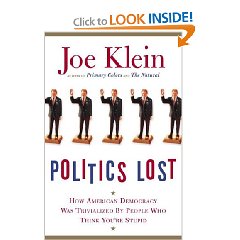
First Class Personal Reflections, Solid and Thoughtful,
I was surprised to not see in the otherwise excellent bibliography any reference to Lewis Mumford's Pentagon Of Power: The Myth Of The Machine, Vol. II and this confirms my impression that each generation reinvents the wheel, and discovers persistent truths for itself. The author does quote Dwight Eisenhower to good effect–apart from the normal quote warning us of the military-industrial complex, General and President Eisenhower is quoted on page 206 “National Security over the long term requires fiscal restraint,” and on page 387, “People want peace so much, that one of these days governments had better get out of their way and let them have it.” I point to General Smedley Butler's book, War Is a Racket: The Anti-War Classic by America's Most Decorated General, Two Other Anti=Interventionist Tracts, and Photographs from the Horror of It and to Jonathan Schell's book, which the author acknowledges, The Unconquerable World: Power, Nonviolence, and the Will of the People as excellent complements to this book.
The core concept throughout the book, very ably discussed, is that smart people can be trapped in stupid paranoid bureaucracies. The author takes great care to single out the chain of paranoia from Forrestal to Nitze to Schlesinger to Rumsfeld, Carlucci, and Cheney, with Wolfowift and Perle playing key roles as the apostles of the Cold War and the expansion of Pentagon power and money.
There is substantive morality in this book, as the author reviews the implications of the U.S. unilaterally over-ruling Churchill and Stalin and demanding unconditional surrender of Germany in WWII. The author reviews the manner in which the U.S. took what he calls “terror bombing” and fire bombing of Germany to new immoral heights, causing Churchill himself to ask if we had gone too far. Napalm was developed for that war, and in one compelling vignette the author discusses how in the final days of the war the U.S. sent over 1,000 aircraft to drop napalm on a hapless village because that is how much napalm they had to use up.
The Tokyo fires, killing 900,000 and leaving 20 million homeless are discussed, as is the use of the atomic bomb as a “signal” to Russia. The author is poignant in quoting McNamara as accepting responsibility for two great war crimes–the fire bombings in WWII, and the failed bombings on North Viet-Nam. See my review of the superb DVD documentary with McNamara, The Fog of War – Eleven Lessons from the Life of Robert S. McNamara where I itemize the 11 lessons this great man shares with us.
The other two themes that drive this book, apart from self-interested paranoia and the suppression of individual conscience to the “tide” of bureaucratic politics, are the manner in which the Pentagon in general, and the services in particular, have deliberately ignored good intelligence and manipulated the threat in order to increase their budgets, at the same time that the domestic political process has found that corrupting intelligence in order to feed the military-industrial complex leads to more bribes to Congress to pay for more television ads which keep the same individuals in power over the years–as Ronald Reagan pointed out, there is less turnover in the Congress than in the Politburo, and this author makes it clear that the American public cannot trust the Pentagon, the White House, or the Congress to be honest about the threat or prudent with the taxpayer dollar. Right now, today, the National Ground Intelligence Center, the Army's intelligence center, is under investigation for having an officer specifically assigned to manipulate, modify, and exaggerate the “official” database on ground force threats so as to justify bigger more expensive systems that are not actually needed nor affordable. The Air Force and the Navy are guilty of similar lies. Our military leaders are normal honorable human beings, but “the system” sweeps them along in ways that would shock any citizen.
Another major theme in this book, and it is especially timely as we confront Iran, is that the US has consistently failed to understand normal nationalism, and instead chosen to interpret the Soviet Union, Iran, China, Islam, and the African nations as part of a grand conspiracy. Institutionalized paranoia, and bureaucratic politics (see my review of Morton Halperin's Bureaucratic Politics And Foreign Policy in which one “rule” is “lie to the President if you can get away with it”) lead to pathological budget-driven decisions that REDUCE national security as well as the integrity of both the nation's policy process and the nation's budget, over time.
The author quotes General Lemay, who demanded the U-2 program for himself, as saying that he would launch a pre-emptive war without Presidential authority, if he felt America was threatened. As the Pentagon consolidates its total control over all U.S. national intelligence agencies, we can but lament the very high probability that we will see Iraq times ten as the Pentagon “manufactures” or “perceives” threats that would not be validated by a truly independent intelligence authority.
The author is very careful, as am I, to avoid confusing the “malevolent impersonality of forces they cannot control” (page 302) with the essential goodness and honor of the individuals that serve in the Pentagon and the services. He quotes McNamara on page 303 as saying “Wars generate their own momentum and follow the law of unanticipated consequences.”
The author ends on a positive note. He praises Jonathan Schell, and MIT PhD Student Ms. Randall Forsberg, the latter responsible for The Freeze campaign that ultimately influenced President Reagan and the Congress.
This is a very fine book. Good notes, index, bibliography. This book has soul.








